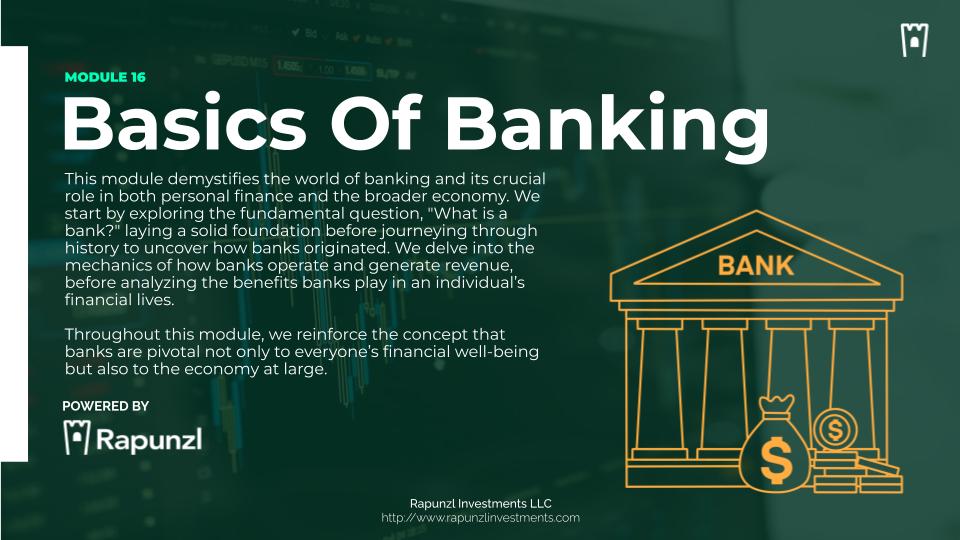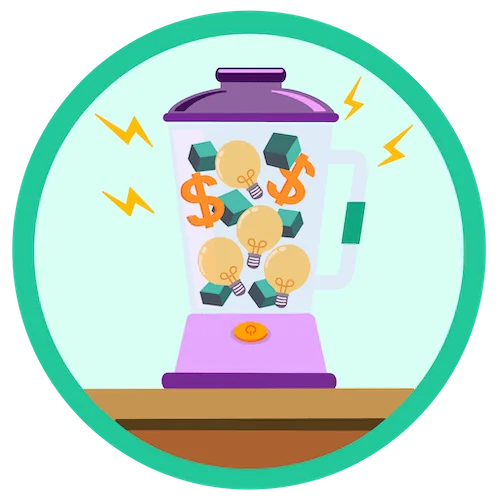
Module 23
The Basics Of Banking
This module demystifies the world of banking and its crucial role in both personal finance and the broader economy. We start by exploring the fundamental question, "What is a bank?" laying a solid foundation before journeying through history to uncover how banks originated.
We then delve into the mechanics of how banks operate and generate revenue, before analyzing the benefits banks play in an individual’s financial lives.
Module At A Glance
Grade Levels:
6th - 12th
Est. Length:
2-3 Hours (21 slides)
Activities:
4 Activites
Articles:
5 Articles
Languages:
English & Spanish
Curriculum Fit:
Math, Business, Economics, CTE, Social Studies
Standards Alignment:
CEE National Standards, Jump$tart National Standards & Relevant State Standards

Guiding Questions
- What is a bank?
- How did banks get started?
- How do banks operate and make money?
- What value do banks have to you?
- What is FDIC insurance?
- Why banks are important to you and to the economy?
- What is the future of banking?
Enduring Understandings
- Banks play an integral role in the global economy by fueling financial growth beyond the financial industry.
- The differences between a commercial bank and an investment bank, and how they both make money.
- How the government protects your money in banks to not create another Great Depression or Financial Crisis.
- What is important when choosing a bank and what should individual's try to avoid.
Module Vocab & Key Topics
Bank
A financial institution licensed to receive deposits and make loans.
Commercial/Retail Bank
A bank that offers services to the general public and to companies.
Investment Bank
A bank that specializes in services for businesses and investors, like underwriting deals for large companies and advising on mergers and acquisitions.
Deposit
Money placed in any type of bank account.
Interest
The charge for the privilege of borrowing money, typically expressed as an annual percentage rate.
FDIC Insurance (Federal Deposit Insurance Corporation)
A United States government corporation providing deposit insurance up to $250,000 to depositors in U.S. banks.
Bank Services
Various offerings provided by banks to their customers, like checking accounts, savings accounts, mortgages, and loans.
Checking Account
A deposit account at a bank that allows withdrawals and deposits, often accessible via checks, ATMs, and electronic debits.
Savings Account
A deposit account that earns interest and is typically used for saving money over a period of time with a minimum account balance that you must maintain.
High-Yield Savings Account
A type of savings account that offers a higher interest rate compared to standard savings accounts.
CD (Certificate of Deposit)
A savings certificate with a fixed maturity date and specified fixed interest rate over that period.
Overdraft Protection
A service that prevents checks, ATM transactions, or debit card purchases from overdrawing a bank account, which can create unexpected fees.
Wire Transfer Fees
Charges applied for electronic transfer of funds from one person or entity to another.
Transaction Fees
Fees charged for certain types of transactions, such as transferring money or making payments.










